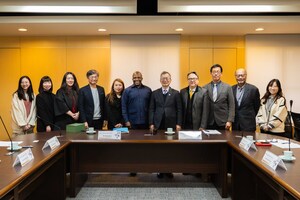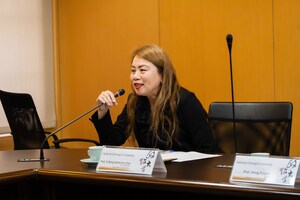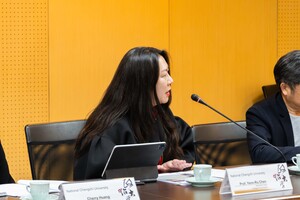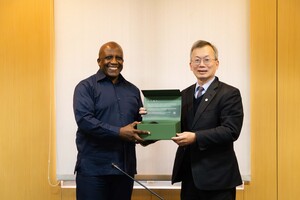Date :
2025-03-24
Department :
Office of International Cooperation (OIC)
【Article by OIC】
Mr. Zakhele Mnisi, the newly appointed Representative of the Liaison Office of South Africa in Taiwan, visited National Chengchi University (NCCU) on March 21 to explore opportunities for academic cooperation and to further strengthen bilateral exchanges in higher education. Last year, with the help of an NCCU South African alumnus, a delegation from the South African office visited the university and engaged in discussions with faculty members. This year, representatives from the College of Informatics, College of International Affairs, College of Innovation and International College, College of Social Sciences, and College of Commerce were invited to join the roundtable discussion, which was hosted by NCCU President Prof. Tsai-Yen Li. Attendees included Prof. Yi-Ning Katherine Chen, Vice President of the Office of International Cooperation; Prof. Jyi-Shane Liu, Dean of the College of Informatics; Prof. Hong-Yi Lien, Dean of the College of International Affairs; Prof. Ping-Yin, Kuan, Professor Emeritus & Chair, ICI International Cooperation Advisory Committee; Prof. Hsiao-Pong Liu, Associate Dean, College of Social Sciences/ Director, International Master's Program in Asia-Pacific Studies; as well as Prof. Yenn-Ru Chen, Professor and Associate Dean for International Affairs at the College of Commerce, and Senior Manager Ms. Cherry Huang.
President Li and Mr. Mnisi each delivered opening remarks, expressing strong expectations for deepening collaboration and developing future partnerships. President Li highlighted that NCCU is a top-tier university approaching its centennial and has long been a cradle of talent for Taiwan’s public sector. Notable alumni include former Presidents Ma Ying-jeou and Tsai Ing-wen. With an active and diverse campus culture, NCCU offers instruction in up to 27 languages, showcasing its outstanding level of internationalization.
Mr. Mnisi thanked NCCU for its warm reception and expressed hope that the visit would deepen Taiwanese understanding of South Africa. He emphasized that higher education is a cornerstone of South Africa's social development. While collaboration in this field takes time, it is a worthwhile effort that can benefit many. Mr. Mnisi provided historical context by noting South Africa’s liberation from apartheid in 1994, and that it has since developed into a mature democracy with over 30 years of history. He expressed a strong desire to explore more diverse partnerships to build a more equitable future for higher education in South Africa. He also praised Taiwan’s innovation-driven economy, which South Africa is eager to learn from.
During the roundtable, NCCU faculty shared highlights from their respective colleges and departments. NCCU is home to Taiwan’s oldest Department of Diplomacy and one of the country’s top business schools. Students from Africa are currently enrolled in programs at the College of Social Sciences and the International College of Innovation. Prof. Yenn-Ru Chen from the College of Commerce noted that both NCCU and WITS Business School (The University of the Witwatersrand) are members of the Partnership in International Management (PIM) network. In 2024, NCCU hosted five South African students during the Global Innovation Challenge, demonstrating Taiwan's goodwill toward South Africa in the field of higher education.
In response to a question raised by Prof. Yi-Ning Katherine Chen on how to attract more South African students to Taiwan, Mr. Mnisi noted that a diverse range of scholarships—not limited to only top-performing students—would be an excellent support mechanism. Programs designed to cultivate business leaders and engineering talent would also appeal to South African students seeking to further their education abroad.
At the conclusion of the visit, President Li presented Mr. Mnisi with a tea gift set that reflects NCCU’s cultural identity and reiterated his hope for continued academic and cultural collaboration, providing more international learning opportunities for students and scholars from both sides.





